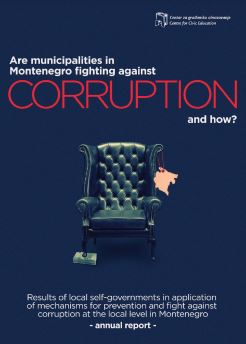Are municipalities in Montenegro fighting against corruption and how?
Are municipalities in Montenegro fighting against corruption and how?
Author(s): Ana Nenezić
Contributor(s): Daliborka Uljarević (Editor)
Subject(s): Politics, Governance, Government/Political systems, Corruption - Transparency - Anti-Corruption
Published by: Centar za građansko obrazovanje (CGO)
Keywords: Montenegro; governance; municipalities; corruption; transparency;
Summary/Abstract: Report Are municipalities in Montenegro fighting against corruption and how? gives an overview of results of local self-governments in the application of mechanisms of prevention and fight against corruption at the local level in Montenegro during 2017 and the first half of 2018. In this regard, the report contains new information in relation to application of defined measures and activities through several strategic documents, to which results of application we have given a first review in the previous report Think Locally – Act Locally which has covered the period until 2016. The observed reporting period has been marked by inertness of municipal administrations in relation to undertaken obligations defined by national documents, as well as the lack of initiative for their own designed activities. Activities of the central level of government in establishing of institutionally-normative anti-corruption framework did not influence encouragingly the local level of government in the part of implementation of adequate anti-corruption policies and mechanisms at the local level. Data that local self-governments in Montenegro, in the last two years (2016 and 2017) do not have reported corruption cases is not surprising, considering that the majority has still not passed local action plans for fight against corruption for 2017-2018, that they have not prepared and passed internal instructions for keeping records of reports of corruption inside the institution and conduct upon reports, to which they were obliged according to adopted integrity plans. Also, according to direct experiences of researchers from the field, local self-governments do not have either established systems and clear procedures for reporting corruption by citizens, which altogether points out to system not being functional. Obligations undertaken within the accession negotiations with the European Union, dominantly through the Chapter 23 (Judiciary and Fundamental Rights) are not being fulfilled, and reporting about them is being done imprecisely, which is causing additional concern. The report of the European Commission for 2018 states: ‘The action plan of Montenegro for Chapter 23 outlines comprehensive reforms to prevent and combat corruption. It is complemented by an ‘operational document’ adopted in 2016 which sets out additional measures to prevent corruption in certain areas particularly vulnerable to corruption, such as public procurement, privatisation, urban planning, education, healthcare, local government and police. The impact of these measures, however, remains limited and Montenegro should develop more effective sector-specific plans for the prevention of corruption.’ Previous recommendations of the European Commission were similar, but obviously with no affect since the local action plans for fight against corruption were not adopted in the majority of Montenegrin municipalities, while integrity plans are being approached to strictly formalistically. Underived system of jurisdiction still remains a problem and it is hard to monitor realisation of anti-corruption documents at the local level due to un-availability of reports on realisation. Precondition of successful fight against corruption is a functional anti-corruption legislative and institutional framework, as well as continuous, consistent and contentfull implementation of strategic documents. Therefore, lack of results should be sought precisely in the inefficiency of the set system, but also in the selected formalistic approach to this issue by the authorised institutions at the national and at the local level. Results of local self-governments in the direction of prevention and fight against corruption, in the observed reporting period are almost non-existent and precisely reflect this impermissible relation. The report covers the period from January 2017 to September 2018 and includes 23 local self-governments in Montenegro. The focus is on two key mechanisms and the effects of their implementation - the local action plan for fight against corruption at the local level and the integrity plan. An overview of the (un)realised measures for the stated period is given, through analysis of the available reports submitted by authorised institutions at the national and local level, as well as through research conducted by utilising the provisions of the Law on Free Access to Information. In addition, the system was tested using the ‘mystery shopper’ method, and results have confirmed the findings obtained by analysing key anti-corruption documents
Series: CGO - Demokratija
- Page Count: 24
- Publication Year: 2018
- Language: English
- Content File-PDF

